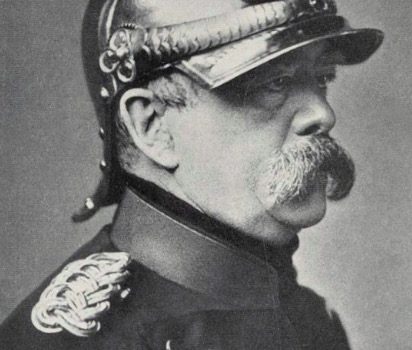

This article is an excerpt from the Shortform summary of "The 48 Laws of Power" by Robert Greene. Shortform has the world's best summaries of books you should be reading.
Like this article? Sign up for a free trial here .
Who was Otto von Bismarck? How did he keep his power in a rapidly-changing Europe? What can he teach us about maintaining power?
Otto von Bismarck was a Prussian diplomat and politician who controlled German foreign affairs for 30 years in the mid- to late-1800s.
We’ll cover what made Otto von Bismarck so powerful and how you can apply those lessons to your relationships and careers.
Lesson #1: Use Decoys to Hide What You’re Up To
Otto von Bismarck, as a deputy in the Prussian parliament, succeeded in his aim of going to war by using a decoy.
In the mid-1800s, the country debated unifying many states into one, and/or going to war against Austria, which was trying to keep Germany divided and weak. King Frederick William IV and his ministers opposed war, preferring to appease Austria. But Prince William and most Prussians favored it.
Bismarck also favored war, as everyone knew. But he thought it was the wrong time to fight — Germany needed time to strengthen its army. So to distract Austria and others from his true true goal he gave a speech against war and even praised Austria.
Everyone was confused, but war was averted for the moment, and the king made him a cabinet minister, which positioned him to start strengthening the army and developing political allies. Eventually, Bismarck became Prussian premier and led the country to defeat Austria and unify Germany.
What We Can Learn from Otto von Bismarck
Like Otto von Bismarck, always hide your true intentions. If you keep people off-balance and in the dark, they can’t counter your efforts. Send them down the wrong path with a decoy and by the time they realize what you’re up to, it will be too late for them to interfere.
Apply the Lesson
To deceive people about your real intentions, take preemptive action to mislead by using decoys and red herrings. Use tools such as fake sincerity, ambiguity, and lures — and people won’t be able to differentiate the genuine from the false to see your goal.
Many people wear their feelings on their sleeves. And when it comes to plans and intentions, they’re quick to tell all at the slightest provocation. People tend to be “open books” because talking about feelings and intentions comes naturally. Watching your mouth — monitoring and controlling what you say — takes effort. In addition, they believe honesty and openness will win people over.
However, honesty has distinct downsides:
- Rather than being an appealing characteristic, honesty is likely to offend people. It’s often better to tell people what they want to hear rather than the less flattering truth.
- If you’re totally honest and open, people won’t respect or fear you because you’ll be predictable (to wield power, you need others’ respect and fear).
In contrast, you can gain and maintain the upper hand by hiding your intentions. Fortunately, hiding your intentions is easy because it’s human nature to trust appearances; the alternative of doubting the reality of what you see and hear — imagining there’s always something else behind it — is too exhausting.
So present a decoy or red herring like Otto von Bismarck — something phony that’s intended to attract attention and thus mislead — and people will take the appearance for reality, and won’t notice what you’re really doing.
Conversely, you can pretend to want something you’re not actually interested in, like Otto von Bismarck, and your opponents will be confused and miscalculate.
Lesson #2: Be Needed
Otto von Bismarck served two weak Prussian kings, Frederick and his brother William, who both needed him desperately; they ceded authority to him and did whatever he told them to do because he’d made it clear that if they didn’t he’d leave them in the lurch.
Otto von Bismarck made sure he could not be replaced. When he joined the Prussian parliament in the 1800s, he immediately aligned himself with the weak king, Frederick. Most people align themselves with powerful people, but it’s difficult to create a mutual dependence with a strong person.
Otto von Bismarck first built up trust by supporting and defending the king against critics and opponents. Frederick rewarded him with a promotion to minister, which Bismarck used to get the king to build up the military and stand up to opponents. He did the same with Frederick’s successor, William, pushing him to be stronger and more decisive. William didn’t like Otto von Bismarck but grew dependent on him, even making him prime minister. Bismarck got whatever he wanted by threatening to resign. Eventually, he manipulated the king into making him emperor.
Like Otto von Bismarck, make sure you’re the only one who can do what you do, and intertwine yourself in your superior’s business to the point that he can’t possibly get rid of you.
What We Can Learn from Otto von Bismarck
The more that a superior needs you, the more security and freedom you have to pursue your goals, so make him dependent on you. Like Otto von Bismarck, never let superiors think they can get along without you.
Apply the Lesson
A big part of exercising power is getting people to do what you want them to do. You can force them in some way, but the best outcome is when they do your bidding willingly. To accomplish this, you make them dependent on you, as Otto von Bismarck did with Frederick and William.
This works with people at all levels but is especially beneficial when the person doing your bidding is a superior and you function as the so-called power behind the throne. Make yourself indispensable to him, become so involved in every aspect of his work that getting rid of you would leave him with huge problems. Then you have the upper hand and can get your way.
People often think that being powerful means being independent, but power requires relationships — with allies, dupes, enemies, and superiors. A completely independent person has freedom but not power. When others are dependent on you, however, you have the independence to pursue your goals.
Make yourself so indispensable that your superior is afraid to tempt fate and find out what her life would be like without you. One way to achieve this kind of position is to have an irreplaceable skill or talent.
Ensure that you’re truly indispensable — don’t take it for granted. Like Otto von Bismarck, be constantly vigilant — at any time someone could appear who could replace you. They may be more appealing to your boss if they’re less costly or less threatening.
Lesson #3: Make Others Feel Smarter
Otto von Bismarck used this tactic to get Count Blome of Austria to sign a treaty beneficial to Prussia but against the interests of Austria. The night before the negotiations started, Bismarck challenged Blome to a round of his favorite card game, quinze. He played recklessly and made rash comments and blunders, which lulled Blome into thinking he didn’t need to worry about anything devious being in the treaty. He signed it the next day without reading the fine print, at which point Otto von Bismarck exulted that he’d never expected an Austrian to sign such a treaty.
What We Can Learn from Otto von Bismarck
Like Otto von Bismarck, make your intended victims feel as though they’re smarter than you are, and they won’t suspect you of having ulterior motives.
Apply the Lesson
Because nobody likes feeling stupid, be careful to avoid insulting another person’s intelligence inadvertently. Going a step further, you can exploit this human vanity to succeed in your schemes.
If you make other people feel smarter than you, by making yourself out to be naive or slow-witted by comparison, they’ll let down their guard and fail to be suspicious of your motives.
Making others feel smarter than you by appearing to be subservient and naive can also help you advance in the ranks, if you’re starting in a low position. You won’t seem threatening to anyone, and you’ll be promoted. At the least, you’ll be left alone to pursue your own interests unnoticed.
Besides downplaying your intelligence, you can do the same with other qualities to lull people into complacency. For instance, make people feel they are more sophisticated or have better taste. They’ll like having you around to make them feel better about themselves, and you’ll have the space to develop your schemes.
Lesson #4: Plan the Ending
In the mid-1800s Prussian leader Otto von Bismarck had a goal of creating a united Germany ruled by Prussia. With this ending always in mind, he planned specific steps for getting there and wasn’t sidetracked by temptations to grab more territory or glory.
Otto von Bismarck’s steps were:
- Incite war with Denmark, not to add territory but to stir up Prussian nationalism and unite the country.
- Incite war with Austria to gain Prussian independence (he refused the temptation to grab Austrian territory).
- Incite war with France to unite the German kingdoms against a common enemy, and prepare for the formation of a united, secure Germany.
Once this was achieved Otto von Bismarck stopped, although his generals wanted to take more land. Although other European leaders expected him to continue his aggression, he worked thereafter to avoid war. Otto von Bismarck wanted unity and security, not more land, and achieving that goal was his last move.
What We Can Learn from Otto von Bismarck
Like Otto von Bismarck, make detailed plans with a clear ending. Think far ahead, take into account all possible developments, and don’t be swayed by wishful thinking. Then pursue your plans and don’t be tempted from your path.
Apply the Lesson
Most people believe that they’re thinking of the future and planning ahead. Instead, they’re actually practicing wishful thinking of what they want the future to be, rather than a future based on reality.
However, unhappy endings occur more often than happy ones. Vague plans will lead to trouble, so make detailed plans before acting. Think about possible unintended consequences, for instance, whether you’ll create new enemies, or whether a circling vulture will swoop in and take the spoils. Anticipate any circumstances that will tempt you to improvise, or to continue beyond your goal, and be ready to reject them. Going beyond your planned ending typically generates a reaction that may well end in your defeat.
Most people focus on smaller immediate dangers and miss seeing the larger dangers that will come later — take the long view with an eye to future pitfalls, remembering that power comes as much from what you don’t do (mistakes you avoid) as from what you do.
Otto von Bismarck knew that the ending is all-important. It determines who gets the prize. Make it absolutely clear and firm, and always keep it in mind, refusing temptations and distractions.
———End of Preview———

Like what you just read? Read the rest of the world's best summary of "The 48 Laws of Power" at Shortform . Learn the book's critical concepts in 20 minutes or less .
Here's what you'll find in our full The 48 Laws of Power summary :
- Why you should never outshine your boss
- How to appear like a friend but behave like a spy
- The 6 rules you absolutely must not violate, if you want to be successful






